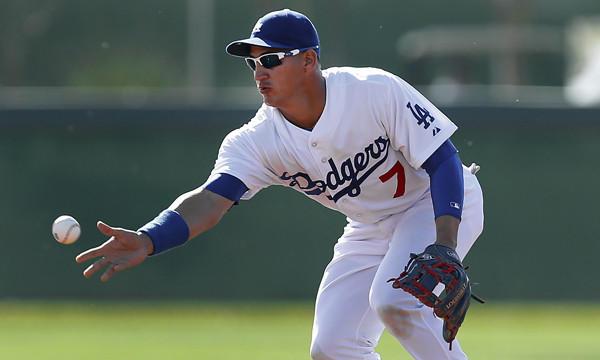Alex Guerrero And The Downside Of The Cuban Market
- Updated: March 4, 2015

(Photo via @Dodgers)
It goes without saying that the Dodgers have had recent success in the market for Cuban baseball players. Yasiel Puig will be a mainstay for the foreseeable future. Onelki Garcia first came up with the team, though he’s now a member of the White Sox. And Erisbel Arruebarrena, despite a slow 2014, is a young infielder that has time to grow into a serviceable big leaguer.
And then there’s the fourth Cuban Dodger, Alex Guerrero. Guerrero, 28, is adamant that he will not go to AAA this year. That’s a problem. When the Dodgers signed him to a four-year, $28-million deal before last season, one of the stipulations was that he couldn’t be sent to the minor leagues after his first season without his permission. Based on his recent comments, that permission will not be granted.
Short of granting that demotion, Guerrero leaves the Dodgers with few options, only allowing for a trade or outright release if he can’t stick with the club. That’s a tough proposition with so much money on the line for his services as, at best, a backup infielder. And it should be a warning sign going forward for a team that just 12 months ago seemed to have the edge on signing Cuban talent.
After Yoan Moncada’s bidding war, teams have shown they will continue to pay exorbitant amounts for talent that, while projectable, is also raw, untested, and far from certain. And not every one of those players will end up like Puig; just like in the draft or free agency, more players will bust than succeed, and more teams will lose money on prospective talent than find hidden gems on the fields of Havana.
Guerrero had a great 2014 at AAA Albuquerque, hitting .329/.354/.613 in 243 PAs across 65 games before being promoted. However, he also missed time after having part of his ear bitten off by Miguel Olivo in a dugout dust-up (to be fair when assigning blame, that was more of a Miguel Olivo problem than an Alex Guerrero problem). Nevertheless, the injury cost him two months and a mid-season call up, and when he finally arrived in September, he only went 1-for-13 with 6 strikeouts in 11 games.
![Alex Guerrero must find a spot this year. [Image via @truebluela]](http://www.calisportsnews.com/wp-content/uploads/2015/03/B9gsXEkIMAIW3ZL.jpg)
Alex Guerrero must find a spot this year. [Image via @truebluela]
In other words, the 2014 status quo may continue in 2015, and Guerrero, despite hitting the cover off the ball at AAA, still might not find a place in Los Angeles. Should he be released (or traded), $28 million to a guy who could end up with as few as 13 Major League at-bats and one total base is tough to stomach. Plus, Guerrero can opt out of his contract after this year, making him a very, very unattractive trade piece. What kind of team would give up something for a one-year rental on an untested not-yet Major Leaguer? (Actually… maybe the Padres.)
With recent success stories like Puig, Jose Abreu, Yoenis Cespedes, Odrisamer Despaigne, and Jorge Soler, the market on Cuban talent is booming. But for as many Puigs as there are, there are even more Guerreros, long on money and short on a big league track record.
Maybe this will all be a moot point if Guerrero makes the team come April. If he doesn’t, and he’s traded or released, it’ll be interesting to see how it affects the seemingly bottomless pit of money being thrown at Cuban prospects.
Dropping a $31.5 million bonus on a 19-year old (as the Red Sox did with Moncada) is not sustainable, and most Cuban prospects who fetch seven-figure contracts will not work out. The next thirty days of Alex Guerrero’s career may go a long way in leveling out the market.
Stay with us at Calisportsnews.com as we will keep you up-to-date on all things Los Angeles Dodgers and the rest of the LA sports teams! All Cali, All the time!




puertorricane
March 5, 2015 at 10:03 pm
There are a lot more guerreros than puigs? LOL ok without looking the numbers i would bet you that more than half of the players that have left cuba have become serviceable major leaguers and many became stars. I think the success rate for cuban players is pretty high. The talent might dry up in a couple of years but there’s still plenty of talent down there. Including the best one of all who broke all of cespedes, puig and abreu records down there Alfredo Despaigne who has been the best player in cuba for the last the last 8 years and in cuba there is no debate about that.
Bobby DeMuro
March 6, 2015 at 10:36 am
I hear you, man, there has been an amazing success rate for
Cuban ballplayers — so far. But you sell Jose Abreu and Yasiel Puig short when you make this argument. They are both once-in-a-decade type talents. Cuban talent is very good, but not everybody in Cuba is going to be a Puig or an Abreu. That’s not my theory; that’s not even a new theory; baseball players have failed at a crazy rate for 135 years. More people wash out of this game than stick. There are more Quad-A guys than big leaguers. (The very best hitters in the history of the game fail 65% of the time!)
So, objectively, there WILL BE more Guerreros than Puigs. The market will correct. What if the Dodgers have to cut/trade Guerrero this spring — $28 million for 13 at-bats? $2.15 million **per at-bat** is not sustainable, even for a team that throws money around like the Dodgers. And other teams will look at that, and look at Moncada’s bonus (depending on how he
does) and say to themselves, hmmm… the risks outweigh the rewards.
Top level American college players fail at an astounding rate in pro ball (Brett Wallace, Kyle Sleeth, Bryan Bullington, Bobby Brownlie, Dewon Brazelton, etc., etc.). Not every American first rounder is Stephen Strasburg; most are not even close.
Japanese players come over with hype and underwhelm, relative to their massive posting fees AND contracts (Hideki Irabu, Kei Igawa, Kosuke Fukudome, Kazuhisa Ishii, Tsuyoshi Shinjo, etc., etc.) Korean players too (look at the current situation the Orioles found themselves in with Suk-min Yoon!).
Each one of those guys is a high profile bust
who made millions of dollars to produce very little relative to their
expectations. And each one moved the needle on their respective markets and fees for un-proven, young talent.
And the same is, and will be, true of Cubans. For every
Puig, there’s a Guerrero, a Sergei Linares, even a Jose Contreras (compare his numbers to his salaries. It’s amazing he stayed in the majors as long as he did considering how ineffective he was after his first season and how much money he was being paid).
Cubans, just like Americans, Dominicans, Venezuelans, Japanese, Koreans, WILL bust. It’s not a question of if, it’s a question of when.
If you don’t believe me, here’s someone far smarter than me
on this exact subject: http://www.foxsports.com/mlb/just-a-bit-outside/story/will-the-cuban-market-correct-121514
puertorricane
March 8, 2015 at 10:53 am
Bottom line is that as long as Cuban players have the benefit of being free agents and going to the highest bidder they will always demand top dollars. Yes some will bust like in every sport where teams overpay for free agents and draft picks. But teams are always looking for the next Aroldis Chapman, Puig, Abreu.
Heck even with the recent injuries from Japanese pitchers if a top one comes over he will demand a lot of money and teams will ignore the injuries. They forgot about Irabu and others that didnt pan out and still payed for Darvish and Tanaka a lot of money. Why would they change their policy towards cuban players.
Bobby DeMuro
March 8, 2015 at 7:40 pm
I agree, but your Japanese-to-Cuban comparison doesn’t hold; the Japanese league is nearly major league quality and MLBers go there and Japanese players come here with regularity so there’s enough of an overlap that it’s somewhat less of a gamble to project talent. Because the Cuban leagues had been closed off for so long until this year’s policy change, there has never been that same exchange of players and it’s difficult to forecast how a player will adjust here. Puig and Abreu are (obviously) outliers.
My big prediction: the market will level very very quickly because Cuba is now open to MLB organizations. Players who five years ago wouldn’t have defected because they didn’t have the monumental talent to take on that monumental risk can now be signed with no political punishment or asylum seeking necessary, and we will soon see that while the top players in Cuba may be as good as Puig/Abreu/Chapman, the depth falls off just as quickly as it does anywhere else.
puertorricane
March 9, 2015 at 9:58 pm
You’re over selling the Japanese league, most of the MLeaguers that go there are over the hill, washed up or players that cant make it here. And only a handful of Japanese players have been able to be stars in the states. Japanese league is triple A level at best.
Bobby DeMuro
March 9, 2015 at 10:02 pm
WHAT?! Please tell me that’s not a serious comment about Japan being AAA quality baseball.
puertorricane
March 9, 2015 at 11:59 pm
What makes Japan baseball higher than triple A, other than your biased opinion what are you basing this on.
Bobby DeMuro
March 10, 2015 at 6:59 am
Now that’s a great question – how do we determine the
quality of a league? Especially comparing two leagues (Japan and Cuba) that are disparate, or comparing two levels (Japan and AAA) that obviously never play each other?
Well, do we start in international competitions? Japan has won two of the three World Baseball Classics, and finished third in the third event. Cuba’s only got one top three finish in the WBC, and they lost to Japan that year. The US has only finished as high as fourth in a year where, again, Japan won it all. So Japan seems to have the edge on Cuba, and the US (and by extension, AAA), and in this case even the rest of the world (!) there.
Do we mention the non-Japanese players who have returned to the MLB from Japan to careers in the big leagues? Ryan Vogelsong, Colby Lewis, Casey McGehee, Gabe Kapler, Scott Atchison, Chris Resop, Eric Stults, and from a few years back, Matt Stairs, Cecil Fielder (!!), and Timo Perez would like a word with you about calling Japan a place for washed-up players that can’t make it here.
Do we touch on the political climate, and Japan’s openness versus Cuba’s um, not, for the past few decades? Because believe me, as poorly as Cuba was treated by the US during the embargo, that matters for the development of a baseball program there, whereas Japan created the best international baseball league on earth, bar none.
Do we talk about money used to recruit players, as you
yourself have made the point about top money for the top talent in Cuba (“as long as Cuban players have the benefit of being free agents and going to the highest bidder they will always demand top dollars”), as if to imply bidding wars are in direct proportion to the quality of the player, not the skewed short-term trends of the market? Well, considering posting fees MLB teams must make in Japan and the insanely valuable contracts on top of that, pound for pound Japanese talent is demanding far more money than Cuban talent and, obviously, much, much more than just purchasing a player’s contract in AAA.
But I don’t know, man. I’ve never watched baseball in Japan or Cuba, and chances are you haven’t either. So all we really know is what’s on paper and what we can figure out from trends and players who have crossed over league to league. As I’ve said before, Japan is not Major League level – but it’s certainly higher than AAA.
And judging by the money they pay American and Latin American players to cross the Pacific, “washed up” isn’t the term I’d use to describe them as they command significantly more than comparable players who are NRIs and then sit in AAA for a season.
puertorricane
March 10, 2015 at 9:47 am
First of all I never said that the Cuban league was better or on par with Japan. I think Cuba is low level AA close to AAA in position players but their pitching is lacking so I’ll say a more older and mature AA league. And yes I have been to Cuba many times and seen their games and passion first hand. They love their baseball over there and is the #1 past time ahead of even politics. Secondly how can you say “I never watched baseball in Japan or Cuba” that statement alone proves you are just biased and talking out of your ass with no proof or objectivity whatsoever.
Thirdly WBC success cant be used to rate a league when a lot of the players dont even play in that league. Dominican Republic won are their summer league now the best. Besides your “The US has only finished as high as fourth” statement nullifies that point completely or any notion that WBC success relates to league strength.
Cuba played the WBC without Puig, Soler, Cespedes, Chapman, Iglesias, and a bunch of other players that have defected. You can make a team with the players that have defected and take first place in WBC.
Irabu bust, Matsuzaka bust, Igawa bust, Nomo only two good years kind of bust, Tanaka hurt, Darvish hurt. Pitchers in Japan throw a lot more by age 17 than even in the states. I can make the case that going after Japanese pitchers is a bigger risk. Yet major league clubs havent been deterred one bit. Just like they will never be deterred to go after cuban players. Heck they are even lobbying the government to change their policy towards cuba to be able to go after the cuban talent a lot easier.
As long as a player has talent clubs will pay and continue to pay because players are their biggest commodity. Without talent they cant sell their product.
Please if you are going to keep replying bring facts and not opinions to the debate. Go look at the stats, Cuban players have been a lot more successful than their Japanese counterparts.
Bobby DeMuro
March 10, 2015 at 10:13 am
Wait, what? I give you an objective list of international competitions and players to argue why Japan has a quality league much higher than AAA and a longer resume than Cuba and you tell me I’m “talking out of my ass” and that I should not bring “opinions” (!!) to the debate? Sorry, brother, I won’t debate baseball with you if you’re going to make ad hominem attacks and ignore my points. That’s (at best) disingenuous.
puertorricane
March 10, 2015 at 11:02 am
“Never seen the Japan nor Cuban league games” that’s your quote and yet you are discussing the merits of which one is stronger. Secondly how does WBC success relates to local league strength when the US with the best players havent finished above fourth. Plus Cuba didnt have their best players who defected and still made it to the finals proving their talent is deep.
Bobby DeMuro
March 10, 2015 at 11:15 am
I can discuss the merits of which one is stronger, as can you (and you are!) despite never having seen Japanese baseball yourself. It’s possible to objectively make as strong of an argument as you can based on the wealth of information you have available, like…
This: http://sports.espn.go.com/mlb/asia/columns/story?id=2781605
Or this: http://www.baseballprospectus.com/article.php?articleid=1330
Or this: http://www.fangraphs.com/blogs/maybe-its-time-we-stop-underrating-pitchers-from-asian-countries/
Or this: http://bleacherreport.com/articles/1847398-how-good-is-the-japanese-professional-baseball-league
Regarding one other point you’ve made, about how there are more Cubans who have been more successful/abundant than Japanese players in Major League Baseball: I’d implore you to consider the political climate of each nation in regards to baseball players migrating to America to play.
Japan’s players are paid very well, play at home in front of fans, and can stay in their home country for marketing opportunities and career developments. What incentive do most of them have – even the good ones – to go from NPB to the majors if it means leaving their families and culture where they were treated well and paid handsomely for an opportunity that isn’t a sure thing?
Cuba, on the other hand, has a well documented political history and players have sought asylum to escape a dead-end, no money, no future, and no opportunities in baseball in their home country (see: Puig, Yasiel). It will be interesting to see how Cuba reacts to the loosening of regulations and the opening of the market to American teams without the need for political asylum. And that goes back to my main point: as more Cuban players become available more easily through less political red tape and more scouting, plan on more of them to bust, just as players from ANY culture bust all the time.
puertorricane
March 10, 2015 at 10:35 pm
You posted four websites where guys are giving their opinions just like you did here in your article. Once again I keep telling you and bringing numbers but you ignore them. List the amount of Cuban players that have made the move to the US and what percentage has had success and then go do the same with japanese players and you’ll see that Cuban players have had a better rate of success.
Second point you make is that the Japanese players have no need of coming over to the US because they can make a good living playing at home. But that’s not my point, I’m talking about the ones that have made they move to MLB. If you go by percentage of the number of players and the ones that have become stars and good players Cuba wins it easily. Around 30 or 40 Japanese players have made the move and only 5-10 have been great depending on how you define great. And of those, two, Darvish and Tanaka are already hurt so they also might be busts because of injuries. Compare that to Abreu, Puig, Chapman, Cespedes, Ordoñez, Jose Fernandez, etc.
You keep betting on Cuban players to bust in the future but you keep forgetting that once the top talent leaves the island, major league clubs wont be paying top dollars for the average players. Hector Olivera is a perfect example, defected a few months ago still no club has been willing to pay top dollars for him.
And the Cuban government has no problem with its players playing in the major leagues. Is the other way around the US government that does not let them play unless they defect. A few Cuban players currently play in Japan once their national season is over. Because Japan has no restrictions on their salaries going back with them to Cuba. Once US policy changes Cuban players would be happy to play in the US and then go back home in the off season. Just like Venezuelan, Dominican and others do.
If Japanese Baseball is so good and on par with MLB how come the majority of players that make the move become fringe players and busts.
Cuba is a baseball factory, if policy changes you’ll see that they produce more players than Dominican Republic, Venezuela or any other latin country. There are over 400 players in the majors from Venezuela and Dominican Republic alone while only 25 players from Cuba. The well is far from drying up in fact its hardly been touched at all..
Bobby DeMuro
March 11, 2015 at 2:41 am
Yeah… in your rush to defend Cuban ball from an attack (that isn’t actually occurring), you *might* have moved the goal posts a bit.
puertorricane
March 11, 2015 at 2:39 pm
I havent moved anything, keep ignoring facts you sound like a politician at a debate.
Bobby DeMuro
March 11, 2015 at 3:17 pm
Haha. Ok, pal.
janetjtillery
December 21, 2015 at 10:36 am
I agree man! That’s a lot of cash for someone who hasn’t been in the majors yet!